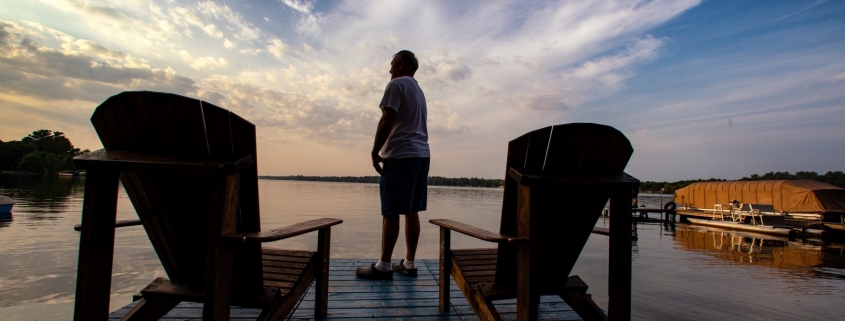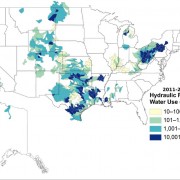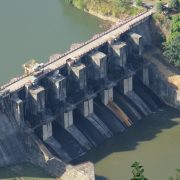2020 Election: Water a Factor in Senate Race in Michigan
A state surrounded by the Great Lakes reckons with aging infrastructure and chemical contamination.

Peters expedited and secured millions in funding for PFAS cleanup at contaminated sites like the former Wurtsmith Air Force Base near Oscoda. © Circle of Blue / J. Carl Ganter
By Hannah Ni’Shuilleabhain, Circle of Blue
With the U.S. Senate majority at stake in the 2020 election, nearly every race has become a battleground. That’s the case in Michigan, where incumbent Democrat Gary Peters is being challenged by Republican John James.
While Covid and the economy dominate debates, water is also a defining issue for a state surrounded by the Great Lakes and beset by aging infrastructure and chemical contamination of its lakes, streams, and groundwater.
“We know in Michigan, clean drinking water and protection of the Great Lakes are top issues for Michiganders,” said Mary Brady-Enerson, Michigan director for Clean Water Action, an advocacy group. She points to surveys before the 2018 election such as one by EPIC-MRA for Fix MI State that found 45 percent of voters believe drinking water safety is the most concerning problem with state infrastructure.
Clean Water Action endorsed Peters in February, mentioning his work on Michigan issues like recognizing and limiting PFAS contamination and pushing for oversight of the aging Line 5 oil pipelines. Peters expedited and secured millions in funding for PFAS cleanup at contaminated sites like the former Wurtsmith Air Force Base near Oscoda. Brady-Enerson praised his pressuring of Enbridge Energy on Line 5, which resulted in the company committing to temporary shutdowns during severe weather and releasing footage of damage to the pipelines after an anchor struck them in April 2018.
James entered the race touting his business and leadership credentials. After eight years in the Army, James worked at his family’s supply chain management company. As company president he served on councils for former Gov. Rick Snyder and Detroit Mayor Mike Duggan on veteran support and automation developments. His background on environmental issues is less extensive. Previous water-related work includes criticism of the Obama administration’s definition of which water bodies have federal protection. Though the Trump administration overturned the rule, James criticized Peters’s support, saying the Obama-era interpretation burdened Michigan agriculture with federal regulation. James prefers “bottom-up regulatory reform” in terms of environmental regulations, and promises to join the Senate Climate Solutions Caucus, of which Peters is not a member.
The Michigan race could influence control of the Senate. While Republicans currently hold a majority, Democrats only need to secure four of the 23 Republican-held seats that are up for election in order to flip control of the chamber. That is assuming Democrats don’t lose any contests. Polls of likely Michigan voters show Peters up by six to nine percentage points. National super PACs on both sides have spent a total of more than $65 million. To defend their seat, the Democratic Senate Majority PAC has spent double what the Republican Senate Leadership Fund has.
James supported the Republican Party’s 2018 spending bill that would have cut funding for the Great Lakes Restoration Initiative. GLRI is a federal program for cleaning up the watershed’s legacy pollution, removing invasive species, and restoring wetlands. James’s campaign spokesperson told Bridge Michigan that he did not oppose the bill because of the GLRI funding. Peters, for his part, secured an additional $19 million for GLRI in fiscal year 2020. Michigan is historically the largest beneficiary of the fund.
“The reality is a lot of this stuff is interconnected,” said Brady-Enerson about Great Lakes water issues. Federal funding in water security affects the Great Lakes economy, shown in a 2018 study by the University of Michigan. The study estimated that for every dollar of federal spending in GLRI’s first six years, the regional economic output would be boosted by $3.35 through 2036.
“The folks I talk to, they get that our environment–the air we breathe and the water that we drink–impacts everything,” said Brady-Enerson. “Water is life, and it seeps into all these other issues as well.”
Hannah Ni’Shuilleabhain is a student at Northwestern University’s Medill School of Journalism and completing her Journalism Residency at Circle of Blue. She has reported for her college radio WNUR and online magazine NorthByNorthwestern on campus events, Evanston-Chicago news and scientific research. Based in her hometown Plano, Texas, her interests include rowing and learning Turkish.











Leave a Reply
Want to join the discussion?Feel free to contribute!